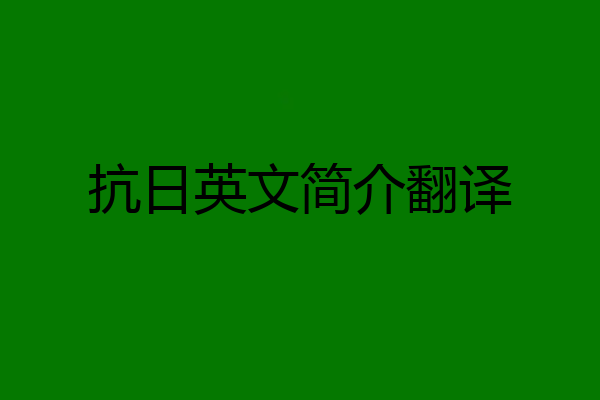
Jamietee1997
抗日战争 kang ri zhan zheng 1.the War of Resistance Against Japan (1937-1945)


Elaine暖阳
中文里的抗日战争的通常翻译为:War of Resistance Against Japan, 或者叫八年抗战 Eight Years' War of Resistance, 或简称 War of Resistance (抗战)

幸福的小猫zz
The War of Resistance Against Japan refers to a nationwide all-out war against Japanese aggression during the Second World War in the middle of the 20th century; since the total war lasted about 8 years, it was also called the Eight-year War of Resistance, or simply the War of Resistance.
In 1931, after the September 18th Incident of the Japanese invaders, they completely occupied Northeast China and established a pseudo-Manchurian state. Since then, they have provoked war conflicts in North China and Shanghai. On July 7, 1937, the Japanese army provoked the Lugou Bridge Incident near Peiping, and the Sino-Japanese War broke out.
中文对照:抗日战争是指20世纪中期第二次世界大战中,中国抵抗日本侵略的一场民族性的全面战争;由于全面战争时间约为8年,亦被称为八年抗战、或简称为抗战。
1931年,侵华日军发动九一八事变后,完全侵占中国东北,并成立伪满洲国,此后陆续在华北、上海等地挑起战争冲突。1937年7月7日,日军在北平附近挑起卢沟桥事变,中日战争全面爆发。
扩展资料:
抗日战争的意义:
中国人民抗日战争,是中华民族历史上最伟大的卫国战争,是中国人民反抗日本帝国主义侵略的正义战争,是世界反法西斯战争的重要组成部分,也是中国近代以来抗击外敌入侵第一次取得完全胜利的民族解放战争。
中国的抗日战争是世界反法西斯战争的东方主战场,抗日战争的胜利,为新民主主义革命的彻底胜利奠定了基础。随着时代的进步和实践的发展,中国共产党对抗日战争的认识视角逐渐拓宽、认识内容不断深化、认识方法趋向科学。
参考资料来源:
百度百科-抗日战争

美洋洋童装店
九一八事变(又称沈阳事变;日本称满洲事变,因中国东北被日本称作满洲)指1931年9月18日在中国东北爆发的一次军事冲突和政治事件。冲突双方是中国东北军和日本关东军。九一八事件爆发后,日本与中国之间的矛盾进一步激化,而在日本国内,主战的日本军部地位上升,导致日本走上全面侵华的道路。这次事件爆发后的几年时间内,东北三省全部被日本关东军占领,因此被中国民众视为国耻,直至今日,9月18日在中国许多非正式场合都被称为“国耻日”。In the evening of September 18, 1931, the Japanese invasion army--Kantogun (Kwantung Army) voluntarily blew up a section of the South Manchuria Railway which was near Liutiao Lake on the suburb of Shenyang, but they accused Chinese troops of destroying the railway. On this pretext, they attacked Beidaying and Shenyang City where the Chinese troops were stationed. Soon afterwards, they occupied more than 20 cities and vast surrounding areas within only several days. That was the “September 18 Incident” that shocked China and the whole world at that time. 1931年9月18日晚上,日本驻中国的侵略军——关东军,自行炸毁沈阳北郊柳条湖附近南满铁路的一段路轨,反诬中国军队破坏铁路,并借此突然袭击了东北军驻地北大营和沈阳城。随即在几天内侵占20多座城市及其周围的广大地区。这就是当时震惊中外的“九·一八”事变。 1931年9月18日夜,日军以其制造的“柳条湖事件”为借口,大举进攻沈阳。当时,国民政党政府正集中力量进行反我共反我人民的内战,对日本侵略者采取卖国政策,命令东北军“绝对不抵抗”,撤至山海关内。日本侵略军乘虚而入,于9月19日占领沈阳,接着分兵侵占吉林、黑龙江。至1932年1月,东北三省全部沦陷。1932年3月,在日本帝国主义的扶持下,傀儡政权——伪“满洲国”在长春建立。从此,日本帝国主义把东北变成它独占的殖民地,全面加强政治压迫、经济掠夺、文化奴役,使我东北3000多万同胞,惨遭涂炭,陷于水深火热之中。 In the evening of September 18, 1931, the Japanese troops mounted a large-scale offensive against Shenyang on the pretext of the “Liutiao Lake Incident”. At that time, the Kuomintang Government was concentrating troops on the anti-communist and anti-people civil war, adopted a policy of quislism towards the Japanese invaders, order troops stationed in Northeast China “not to resist absolutely” and withdraw to the inside of the Shanhai Pass. The Japanese invaders took advantage of this weak point, occupied Shenyang on September 9 and then divided troops to respectively occupy Jilin and Heilongjiang. By January 1932, the three provinces in Northeast China all fell into the enemy hands. In March 1932, under the aegis of the Japanese Imperialism, the puppet regime—the puppet “State of Manchukuo” was founded in Changchun. From then on, The Japanese Imperialists had changed Northeast China into Japan's exclusive colony, fully strengthening political oppressions, economic plunders and cultural enslavements. Our 30 million compatriots in Northeast China were plunged into an abyss of misery and suffering. “九·一八”事变激起了全国人民的抗日怒潮。各地人民纷纷要求抗日,反对国民政党政府的不抵抗的作法。在中国共产党的领导和影响下。东北人民奋起抵抗,开展抗日游击战争,先后涌现出东北义勇军等各种抗日武装。1936年2月,东北各抗日部队统一改编为东北抗日联军。1937年“七·七”事变后,抗日联军团结广大群众,进一步开展了广泛持久的抗日武装斗争,有力地配合中国共产党领导的全国抗战,终于迎来了抗日战争的胜利。 The “September 18 Incident” aroused people's angry tide of resistance against Japan all over China. People all over the country successively demanded resistances against Japan and opposed the Kuomintang Government's non-resistance policy. The people in Northeast China were roused to resist and launched anti-Japanese guerilla warfare. Various armed anti-Japanese forces including the Northeast Volunteers appeared. In February 1936, all anti-Japanese troops were uniformly reorganized as the Anti-Japanese Amalgamated Army of the Northeast. After the Marco Polo Bridge Incident in 1937, the Amalgamated Army united vast majority of masses to further lunch protracted comprehensive armed anti-Japanese struggles, effectively coordinating the nationwide War of Resistance against Japan led by the Communist Party of China, and finally gained the victory over Japan. “九·一八”事变的发生,是日本帝国主义为了吞并中国、称霸亚洲及太平洋地区而采取的一个蓄谋已久的重要侵略步骤。早在1927年夏,日本内阁就在东京召开“东方会议”,制定了《对华政策纲领》,声称中国东北“在(日本)国防和国民的生存上有着重大的利害关系”。同年7月,内阁首相田中义一向帝皇奏呈“田中奏折”,公然宣称:“欲征服中国,必先征服满蒙,欲征服世界,必先征服中国”,从而确立了在“满蒙”建立侵略基地的狂妄战略。1931年,日本军部秘密制订了有关侵略我国东北的方针、步骤和措施。在完成了发动侵略战争的周密准备之后,日本帝国主义悍然发动了“九·一八”事变,揭开了对中国、进而对亚洲及太平洋地区进行全面武装侵略的序幕。 The launch of the “September 18 Incident” was a long-premeditated important invasion step taken by the Japanese Imperialists for annexing China and dominating Asia and the Pacific Region. Early in the summer of 1927, the Japanese Cabinet held the “Oriental Meeting” and mapped out the “Political Platform towards China” in Tokyo, proclaiming that the Northeast China “has great interests in terms of (Japan's) national defence and people's existence”. In July of the same year, the cabinet prime minister Tanaka Giichi submitted the“Tanaka Memorial”to the Mikado, publicly proclaimed: “In order to conquer China, we must first conquer Manchuria and Inner Mongolia, and in order to conquer the world, we must first conquer China”, thereby decided the presumptuous strategy of establishing invasion bases in “Manchuria and Mongolia”. In 1931, the Japanese Army Headquarters secretly formulated the principles, steps and measures for invading Northeast China. After careful preparation for the invasion war, the Japanese Imperialists blatantly launched the “September 18 Incident”, it was a prelude to all-around armed invasions to China, then Asia and the Pacific Region.
优质英语培训问答知识库